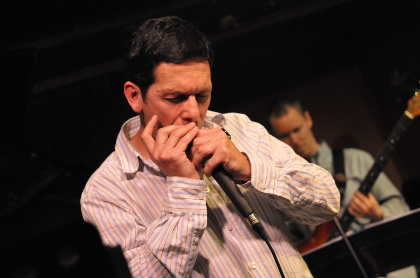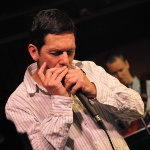- country:South Africa
- region:Southern Africa
- style(s):Jazz, South African
- label:Sunnyside Records (USA)
- type:Band
- artist posted by:African Hypertext LLC
Line up
- Adam Glasser (chromatic harmonic, township jazz piano)
- Andy Hamill (double bass)
- Anita Wardell (vocals)
- David Serame (spoken word narratives)
- Pinise Saul (Xhosa and English vocals)
- Robin Aspland (piano)
- Steve Watts (double bass)
- Tristan Mailliot (drums)
South African-born chromatic harmonica player (and pianist) Adam Glasser is at once a true original and a guardian of one of the world's most identifiably national jazz traditions (South Africa's tradition comparing favourably with Cuba's and Brazil's for its originality and local colour). He has developed a highly personal sound, both on harmonica and on what some call "township jazz piano."
Alongside the legendary Toots Thielemans, the incomparable Stevie Wonder, and his contemporary Gregoire Maret, Glasser stands in a small circle of those who have discovered, in the dynamics of the chromatic harmonica, a soulful palette for jazz improvisation on chord changes in any of the twelve keys.
With Free at First, his debut album as a leader, Glasser seeks to give this underappreciated instrument a well-deserved moment in the sun. He does so by translating a mixture of jazz chestnuts (Irving Berlin's 'How Deep is the Ocean?' and Kaper and Washington's 'On Green Dolphin Street'), modernist standards (Thelonious Monk's 'I Mean You' and Jackie McLean's 'Little Melonae'), a Brazilian song (Ivan Lins's 'Maos de Afeto'), classic South African material (Caiphus Semenya's 'Part of a Whole', and, from the 1960 'jazz opera' King Kong, Todd Matshikiza's 'Quickly in Love'), and originals into a chromatic harmonica language that he has caressed to a simple, graceful brilliance.
Aided by Robin Aspland's elegantly supportive piano, and by a fine ensemble including Tristan Mailliot on drums, and Steve Watts and Andy Hamill on bass, and featuring vocalist Anita Wardell's virtuosic scat on 'Little Melonae', Glasser succeeds mightily at this first task of birthing practically a new voice in jazz.
But there is another dimension to this record, the South African dimension, which tugs relentlessly at the listener's psyche. Free at Firstis also the work of a performer who knows and cherishes "that South African crying sound" - as Glasser himself describes it - "that you hear in the great saxophonists like Barney Rachabane and Kippie Moeketsi, and in trumpeters and other soloists."
At turns unabashedly nostalgic and sparklingly post-modern, Free at Firstembraces a collage of thematic elements. The album daringly balances, for instance, David Serame's spoken-word performances on 'The Low Six' and 'African Jazz and Variety' (set within Glasser's understated township piano envelope) or the show-tune treacle of 'Quickly in Love' against the percussive duet 'Kort Street' (with Glasser on pounding acoustic piano and Mailliot on South African-inflected drums) or Aspland's transporting electric piano on 'Part of a Whole'.
As a young musician growing up in Johannesburg, and coming to musical maturity in London, Glasser exulted in the raucous township pop-jazz sound of the 70's, exemplified by such songs as Rachabane's 'Tegeni' and 'Mafuta', and pianist Tete Mambisa's 'Stay Cool', and by the so-called 'sax jive' of players like Thomas Phale and David Thekwane. More influential on Glasser than anyone (he says) were saxophonist Bra Sello and a group called The Drive, whose saxophonist, Henry Sithole, died in an automobile accident at the height of their popularity.
Glasser was later the architect of the renaissance in London (and eventually of the post-apartheid South African homecoming) of the iconic Manhattan Brothers vocal group, led by Joe Mogotsi. Their association yielded both a string of memorable live performances abroad and a sadly unheralded South African release of their brilliant comeback recording, Inyembezi, produced by Glasser in 2006.
Along the way, Glasser became an intimate of Joe Zawinul's (Glasser and Aspland's 'Remembrance', the concluding piece on Free at First, is a remembrance of Zawinul) and he served as the pianist in various 'London township' ensembles fronted by the late alto saxophonist Dudu Pukwana and featuring their wonderful female vocal cohort Pinise Saul, who appears with brio on Free at First on 'Mjo' (a tribute to the late Churchill Jolobe, the irrepressible drummer in those groups).
Free at First's distinctive melodic cry amply fulfills Adam Glasser's ambition to represent South African jazz voicings on chromatic harmonica. Having done so, this record may very well just be a musical facet of some otherwise unexpressed dream of a new South Africa, reinventing itself with pieces of its history as building blocks for the future. Glasser - whose performances link the cauldron years of apartheid with the more encouraging (though still challenging) times now at hand - supplies a probing, soaring soundtrack for that South African dream.



